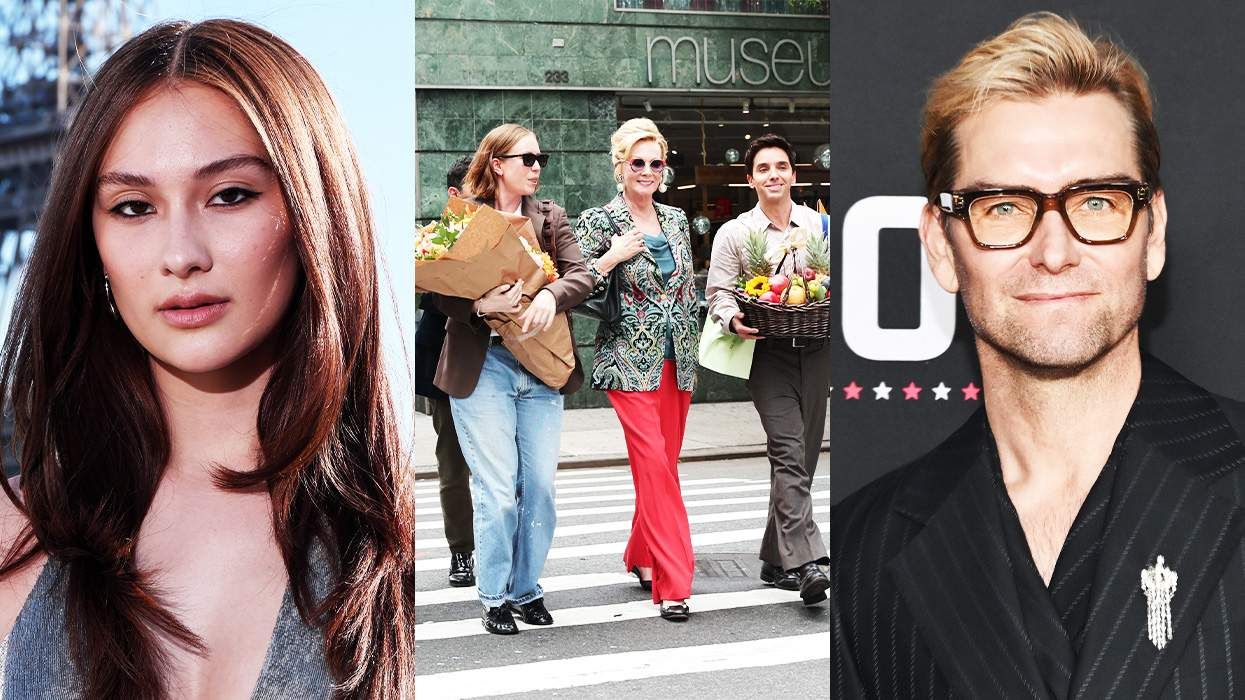At the end of the first episode of the Will & Grace revival last fall, Grace (Debra Messing) leaves a red "Make America Gay Again" hat on President Trump's chair in the Oval Office.
The symbolic gesture was a signal to America (and the current political administration) of why the NBC comedy, which originally left the air in 2006 after eight seasons, had returned to network television. In an era when the rights of LGBTQ people were once again under attack, Grace, Will (Eric McCormack), Jack (Sean Hayes), and Karen (Megan Mullally) had come back to make the country laugh -- and to remind them once again of the humanity of queer people.
On the eve of the 10th season's premiere (with an 11th already ordered by the network, due to the revival's popularity), the cast, in a conversation with The Advocate on the Will & Grace set, reflected on the warm reception they received from television viewers. "It didn't feel like we had to muscle our way back in, but rather that people had saved a little place in their hearts, and that was reassuring," McCormack said.
"I feel just being on the air every single week celebrating the LGBTQ community is something that feels necessary right now, and it makes me feel good about waking up in the morning," Messing added.
Did Will & Grace succeed in their mission of making America gayer? "Did you see the Emmys the other night? It worked!" exclaimed McCormack, who was overjoyed to see the crew of RuPaul's Drag Race take the stage at the television awards ceremony when the show won Best Reality Competition.
It was not the only queer-centered show to take home gold that night; The Assassination of Gianni Versace: American Crime Story won Best Limited Series and others, with Ryan Murphy citing hate-crime statistics in his acceptance speech. Will & Grace's Mullally and Molly Shannon were nominated for Supporting Actress and Guest Star, respectively, yet the comedy took home no awards that night.
In a way, it's a sign of progress. "We are the straightest gay show of all time," marveled McCormack, who acknowledged the generation of "younger trailblazers" who came along after Will & Grace's first run and are increasing LGBTQ representation in the media. Yet McCormack noted how Will & Grace, with its millions of viewers on NBC from every political persuasion, is still a potent voice in a media landscape that has become increasingly siloed.
"I think that every time a family in middle America that doesn't know a lot of gay people ... sits down and watches this show ... we've done a little something," he said. "There's been a lot of important gay voices for a while, but middle America doesn't get to hear most of them. But they will listen to the daffy foursome from Will & Grace."
Sometimes, McCormack is still amazed by the reach of the gay show in an era when people are very deeply divided along partisan lines. "I've had people, really ultraconservative people, say, 'Oh, my God, I love that show.' And I know they voted for Trump. I'm like, How do you love our show? But then I have to step back and go, I forget. I guess it's not all about that. Sometimes it's just about funny," he said.
And Will & Grace has a lot to say this season. The show will open up beyond its four central characters to focus on their love lives: Jack, amazingly, is engaged to be married to a new beau, Estefan (Brian Jordan Alvarez); Will is changing jobs, while wrestling between his competing desires to be independent and committed; Karen is getting divorced; Grace is falling in love.
That the topics of same-sex love -- and marriage -- be televised is still essential in 2018, Hayes said. The actor noted that America must be reminded yet again that queer love "exists, that it's just as real and normal as [love from any other] human being. I think you can't drive that message home enough, because you think people got it, and then you wait another four-year election cycle."
"I'll keep saying it for as long as I live," Hayes said of the message of LGBTQ equality, adding, "I think just by showing Jack getting married, we just have to remind people that that's a real thing that happens in the world, that gay people get married too."
That Hayes, who was closeted to the press during the first run of Will & Grace, has completed his first season as an openly gay actor has given this message personal significance. "I think just by not having to dodge it with the press [makes being on Will & Grace] much easier," Hayes said of being out as an entertainer. "It's more fun. It's more freeing. It's ... not as big of a change, but you're right, there is a little something in there that makes it more special now."
This season, both Will and Jack are dealing with their own anxieties of being gay men nearing age 50 in the era of marriage equality. The free-spirited Jack is anxious because he is "settling down for the first time," Hayes noted. "Otherwise, he's pretty confident, I mean confident enough to return to theater and write a one-man show based on the secret gay romance of Abraham Lincoln, and it's called Gaybraham Twinkin."
Will, McCormack attested, is a more divided character, who is "confused" about whether he wants to be independent or in a committed relationship. "Sometimes he likes being the silver fox. He likes knowing that he's earned what he [has] and he's still live in New York City and looking good. And other times he's like, What am I doing?" McCormack said. Will, he observed, is "an interesting voice in the gay community" for network TV; he is a person who has seen so many rights gained and then has to then ask himself, What do I do now that I have all those freedoms?
Will & Grace, McCormack added, is different from the rest of the television landscape because it depicts gay love "at a certain age, or the fears of diving back in, and the fears of recommitting after you've gotten out of the habit of being in love."
That Will & Grace centers on a same-sex marriage this season is fitting, since former Vice President Joe Biden once credited the series with paving the way for marriage equality by changing America's hearts and minds. But the actors have also been changed by the experience. Messing -- a powerful advocate for women's rights, LGBTQ equality, and addressing the global AIDS crisis -- confirmed that Will & Grace has made her a more political person.
"I think when we all started Will & Grace [in 1998], obviously our goal was to make people laugh," she said. "But we also recognized that it was a volatile time and that we didn't know if the show was going to be embraced by America. And so for the first year, I think we were keenly aware that there were big swaths of people across the country who just did not want us."
Will & Grace "made me more aware of my privilege," she continued. "I think it made me more empathetic and more angry, frankly. And then once it became clear that the show was having a political and social impact and just how much the show meant to people who had never been represented on prime-time television, I think then that was kind of the real awakening."
"I felt I had a responsibility being connected to the show to be a vocal advocate," Messing said, adding, "I don't think that anything is really a coincidence. I think that Will & Grace came into my life for a reason and I think that it organically led to everything that has followed since. And I feel like this is why I'm here."
Amazingly, Messing said she has never received pushback from the network about her voice -- on Twitter, where she often engages in heated political discourse with actress Susan Sarandon, or otherwise. "They know that I wouldn't listen because I'm outspoken, and I feel like the one thing that is mine is my voice," she said. "I don't contract that away when I signed on to do a job."
As much ground as the show has covered in gay rights, Messing and the cast members feel that even more marginalized people can find a space on Will & Grace. "When we first started again, I said to the writers, 'When we were on the air, we really just covered LGB and I want to cover all the letters of the alphabet so much,'" Messing said, in a reference to transgender representation.
"I really want to see more about race," said Mullally, who has also advocated that her character Karen have a relationship with a woman and/or a person of color. "I've been pitching that since like 2004. Yeah. I think we're ready for that," she said.
Yet Mullally also praised how the upcoming season addresses timely political topics like immigration. She describes how in one episode, Karen, a Trump supporter, "goes down to the border to visit her section of the wall that she's sponsored between Scott Baio and Mark Wahlberg." Unexpectedly, she meets a Mexican woman there and has a "really beautiful" change of heart.
"It's nice to have some levels," Mullally said of the depth of her character, who is known more for her sharp one-liners and egotism than emotional complexity. "They're giving me not just the pratfalls, but they're also giving me things to play that are unexpected for Karen. She has an emotion every now and again that's not horrible."
"I think it's the best season so far on the show," reflected Mullally, who was sitting, in that moment, in the set of the chapel where Karen had grieved the death of her maid Rosario last season. "That's how it feels to me."
Will & Grace premieres tonight at 9 p.m./8 p.m. Central on NBC.















Charlie Kirk DID say stoning gay people was the 'perfect law' — and these other heinous quotes
These are some of his worst comments about LGBTQ+ people made by Charlie Kirk.